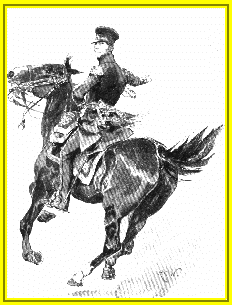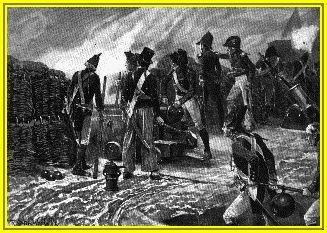The walls of Colberg had fallen into decay. On the ramparts were eighty-six pieces of antiquated artillery. There were so few artillerymen that each piece could have only one. The total garrison was 1,000 soldiers which were unfit to serve with the line.
During the Days of Frederick II, Colberg had steadily resisted three Russian attacks. Part of this was because the citizens of Colberg had manned the walls along with the soldiers. This had become tradition, and as the French advanced, an old seafaring man named Nettelbeck called together this volunteer militia and presented it to the fortress Commandant. The Commandant, an old aristocrat sent them away with the phrase: "Stop this nonsense, you silly people. For goodness sake, return to your homes."
This citizen militia worked behind their Commandant's back to prepare Colberg for the struggle that would soon occur. As the French neared, Nettelbeck made an inventory of the food supply. Seeing that there was not enough provisions for a protracted siege, Nettelbeck approached the Commandant with this information, was treated to insults and sent away.
 The Demand for the Surrender of
Colberg, by Woodville
The Demand for the Surrender of
Colberg, by Woodville
On March 15, 1807 a French officer bearing a flag of truce was admitted into the fortress. He and his party held a secret conference with the fortress Commandant for many hours.
Suspecting treachery, old Nettelbeck wrote to his King who was in Memel, 300 miles away. Frederick Wilhelm had as little use for a civilian militia as the fortress commandant, but with most of the other fortresses falling with no fight at all, he was desperate. He promised to send a commandant of energy. Meanwhile the citizens of Colberg devoted their lives and fortunes to fighting the French and thwarting the unpatriotic attempts of the commandant.
 Nettelbeck Threatens the
Commandant, by Woodville
Nettelbeck Threatens the
Commandant, by Woodville
On April 5th, while the bombardment was going on, the fortress Commandant happened upon the marketplace just as a few bombs exploded harmlessly nearby. Bewildered, the Commandant stammered: "If this goes on, gentlemen, we shall have to give in." Angered, Old Nettelbeck stepped forward, unsheathed his sword and shouted so that all could hear: "The first man that dares to repeat that damned suggestion of surrender dies...and I shall kill him!" Pointing his sabre at the Commandant's chest, he said to the citizens: "Now is the time to show the stuff that is in us! Let us do our duty...or we deserve to die like dogs!"
The fortress Commandant called to have Nettelbeck arrested and executed. This caused such an uproar that the order had to be rescinded.

 Gneisenau, by Woodville
Gneisenau, by Woodville Schill, by Woodville
Schill, by Woodville Gneisenau
and Nettelbeck on the Ramparts at Colberg, by Woodville
Gneisenau
and Nettelbeck on the Ramparts at Colberg, by Woodville